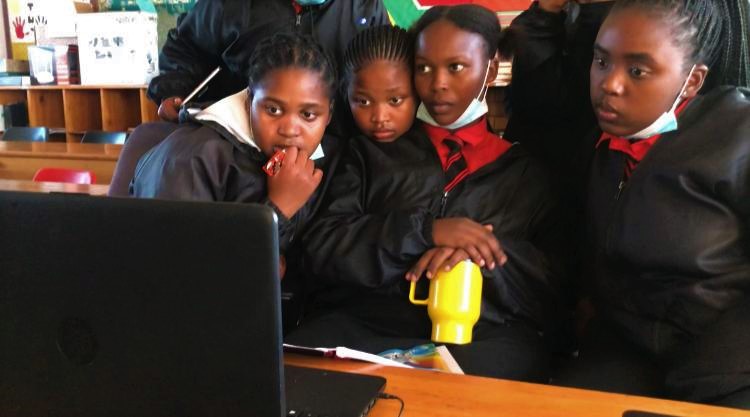[et_pb_section admin_label=”section”]
[et_pb_row admin_label=”row”]
[et_pb_column type=”4_4″][et_pb_text admin_label=”Text”]While digital technology has been around for quite some time, we saw it fully implemented during the COVID-19 pandemic. This meant a huge shift from traditional learning to e-learning. Before 2020, how many young people were equipped with digital skills? Additionally, what is being done to ensure that they are fully exposed to digital technology? Zuko Gqadavama, a Monitoring, Evaluation and Research Coordinator from Inkululeko, a Makhanda-based grantee – shares how they’ve incorporated these necessary skills into their programmes.
What does your organisation do to equip youth with digital or e-learning skills?
The Covid-19 pandemic disrupted many things, including education, and After School programmes were no exception. After School programmes exist to address educational inequalities, and Inkululeko “understood the assignment” when the pandemic exacerbated these inequalities. The organization moved its operations from in-person to online. This meant making greater use of technology to facilitate learning and, in the end, equipping youth with digital skills as they navigate the pandemic. Aside from the use of ICT tools, our students have the opportunity to virtually interact with tutors in the United States. Some of our e-learning programs include virtual tutoring sessions, the OLICO Maths project, and digital interactions with institutions of higher learning in the United States.
Why is it important for youth from under-resourced communities and schools to receive access to digital learning and resources?
I wish I could give a broad response, but the gravity of the situation is deeper. The issue of access to digital learning and resources in underserved schools’ touches on three issues: 1. education inclusion, 2. equality, and 3. human rights. The Covid-19 pandemic demonstrated the importance of having access to digital learning and resources. This is not just an intervention, but also an acknowledgment of the human condition. If under-resourced communities and schools are denied access to digital learning and resources, learners will be excluded from education. We live in a digital world where most learning takes place or is accessed through digital equipment, so access to digital learning equals inclusion in education. Youth from under-resourced communities having access to digital learning and resources would mean equal opportunities, which is in accordance with legal rights. It is critical to ensure that any advancement in education takes these rights into account.
Besides practical knowledge and access to digital technology, what else do you think South African youth need to thrive?
To be honest, before South African youth can thrive in anything, they need opportunities, opportunities, and lots of them.
We live in a digital world where most learning takes place or is accessed through digital equipment, so access to digital learning equals inclusion in education.
[/et_pb_text][/et_pb_column]
[/et_pb_row]
[/et_pb_section]
